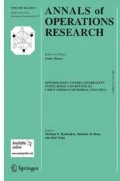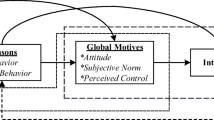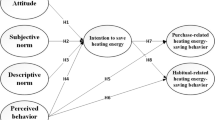Abstract
With the increase in energy consumption and carbon dioxide emissions, promoting an energy-saving lifestyle among residents has become an urgent environmental and social need. Studying factors that influence household daily energy-saving behaviors may help the government draft policies for reducing the energy consumption and promoting the sustainable development of the human economic society. In this study, we investigate the features of energy-related situational factors, individual/household energy consumption behavioral norms, and energy-saving behavioral intentions by performing a questionnaire survey in Beijing. We examine the relationships among the mentioned aspects by applying factor analysis and structural equation modeling. Results show that among the three aspects assessed, situational factors most significantly and effectively influence the residents to assume energy-saving behaviors. Energy-saving behavioral norms partly mediate the relationship between situational factors and behavioral intention. We propose practice policy implications on the basis of the results. In particular, the positive influences of situational factors should be strengthened, and relevant policy measures should be emphasized to establish a situational background beneficial for accelerating the formation or transformation of energy-saving behaviors.



Similar content being viewed by others
References
Abrahamse, W., & Steg, L. (2009). How do socio-demographic and psychological factors relate to households’ direct and indirect energy use and savings? Journal of Economic Psychology, 30(5), 711–720.
Abrahamse, W., Steg, L., Vlek, C., & Rothengatter, T. (2005). A review of intervention studies aimed at household energy conservation. Journal of Environmental Psychology, 25(3), 273–291.
Ajzen, I. (1991). The theory of planned behavior. Organizational Behavior and Human Decision Processes, 50(2), 179–211.
Ajzen, I., & Fishbein, M. (1980). Understanding attitudes and predicting social behaviour. New Jersey: Prentice-Hall.
Ajzen, I., & Madden, T. J. (1986). Prediction of goal-directed behavior: Attitudes, intentions, and perceived behavioral control. Journal of Experimental Social Psychology, 22(5), 453–474.
Andrews-Speed, P. (2009). China’s ongoing energy efficiency drive: Origins, progress and prospects. Energy Policy, 37, 1331–1344.
Armitage, C. J., & Conner, M. (1999). Distinguishing perceptions of control from self-efficacy: Predicting consumption of a low-fat diet using the theory of planned behaviour. Journal of Applied Social Psychology, 29(1), 72–90.
Bamberg, S. (2003). How does environmental concern influence specific environmentally related behaviors? A new answer to an old question. Journal of Environmental Psychology, 23, 21–32.
Banfi, S., Farsi, M., Filippini, M., & Jakob, M. (2008). Willingness to pay for energy-saving measures in residential buildings. Energy Economics, 30(2), 503–516.
Bentzen, J. (2004). Estimating the rebound effect in US manufacturing energy consumption. Energy Economics, 26(1), 123–134.
Boudet, H., Ardoin, N. M., Flora, J., Armel, K. C., Desai, M., & Robinson, T. N. (2014). Energy behaviours of northern California Girl Scouts and their families. Energy Policy, 73, 439–449.
Brabander, B. D., & Thiers, G. (1984). Successful information system development in relation to situational factors which affect effective communication between MIS-Users and EDP-Specialists. Management Science., 30(2), 137–155.
Browne, M. W., & Cudeck, R. (1992). Alternate ways of assessing model fit. Sociological Methods and Research, 21(2), 230–258.
Davis, M., Challenger, R., Clegg, C., & Healey, M. (2008). Understanding and promoting green behaviour in the use of existing buildings. London: Report to Arup plc.
Derksen, L., & Gartrell, J. (1993). The social context of recycling. American Sociological Review, 58(3), 434–442.
Farahbakhsh, H., Ugursal, V. I., & Fung, A. S. (1998). A residential end-use energy consumption model for Canada. International Journal of Energy Research, 22(13), 1133–1143.
Fishbein, M., & Ajzen, I. (1975). Belief, attitude, intention, and behaviour: An Introduction to theory and research. Boston: Addison Wesley.
Fornell, C., & Larcker, D. F. (1981). Structural equation models with unobservable variables and measurement error: Algebra and statistics. Journal of Marketing Research, 18(3), 382–388.
Frederiks, E. R., Stenner, K., & Hobman, E. V. (2014). Household energy use: Applying behavioral economics to understand consumer decision-making and behavior. Renewable and Sustainable Energy Reviews, 41, 1385–1394.
Gerardine, D. S., & Gallupe, R. B. (1987). A foundation for the study of group decision support systems. Management Science, 33(5), 589–609.
Gollwitzer, P. M., & Sheeran, P. (2006). Implementation intentions and goal achievement: A meta-analysis of effects and processes. Advances in Experimental Social Psychology, 38, 69–119.
Guagnano, G. A., Stern, P. C., & Dietz, T. (1995). Influences on attitude-behavior relationships: A natural experiment with curbside recycling. Environment and Behavior, 27(5), 699–718.
Guzzo, R. A., Jette, R. D., & Katzell, R. A. (1985). The effects of psychologically based intervention programs on worker productivity: A meta-analysis. Personnel Psychology, 38(2), 275–291.
Harmsen, R., Wesselink, B., Eichhammer, W., & Worrell, E. (2011). The unrecognized contribution of renewable energy to Europe’s energy savings target. Energy Policy, 39(6), 3425–3433.
Herring, H., & Roy, R. (2007). Technological innovation, energy efficient design and the rebound effect. Technovation, 27(4), 194–203.
Hines, J. M., Hungerford, H. R., & Tomerad, A. N. (1987). Analysis and synthesis of research on responsible environmental behavior: A meta-analysis. The Journal of Environmental Education, 18(2), 1–8.
Hori, S., kondo, K., Nogata, D., & Ben, H. (2013). The determinants of household energy-saving behavior: Survey and comparison in five major Asian cities. Energy Policy, 52, 354–362.
Houri, A., & Ibrahim-Korfali, S. (2005). Residential energy consumption patterns: The case of Lebanon. International Journal of Energy Research, 29(8), 755–766.
Hu, L. T., & Bentler, P. M. (1999). Cutoff criteria for fit indexes in covariance structure analysis: Conventional criteria versus new alternatives. Structural Equation Modeling: A Multidisciplinary Journal, 6(1), 1–55.
Knussen, C., Yule, F., Kenzie, J. M., & Wells, M. (2004). An analysis of intentions to recycle household waste: The roles of past behaviour, perceived habit, and perceived lack of facilities. Journal of Environmental Psychology, 24(2), 237–246.
Liu, W., Spaargaren, G., Heerink, N., Mol, A. P. J., & Wang, C. (2013). Energy consumption practices of rural households in north China: Basic characteristics and potential for low carbon development. Energy Policy, 55, 128–138.
Liu, W., Oosterveer, P., & Spaargaren, G. (2015). Promoting sustainable consumption in China: A conceptual framework and research review. Journal of Cleaner Production, 2015, 1–9.
Loock, C., Staake, T., & Thiesse, F. (2013). Motivating energy-efficient behavior with green is: An investigation of goal setting and the role of defaults. MIS Quarterly, 37(4), 1313–1332.
Mirosa, M., Lawson, R., & Gnoth, D. (2013). Linking personal values to energy-efficient behaviors in the home. Environment and Behavior, 45(4), 455–475.
Orbell, S., & Sheeran, P. (2000). Motivational and volitional processes in action initiation: A field study of the role of implementation intentions. Journal of Applied Social Psychology, 30(4), 780–797.
Pan, H., Liu, Y., & Gao, H. (2015). Impact of agricultural industrial structure adjustment on energy conservation and income growth in Western China: A statistical study. Annals of Operations Research, 228, 23–33.
Pidgeon, N., & Fischhoff, B. (2011). The role of social and decision sciences in communicating uncertain climate risks. Nature Climate Change, 1, 35–41.
Poortinga, W., Steg, L., Vlek, C., & Wiersma, G. (2003). Household preferences for energy-saving measures: A conjoint analysis. Journal of Economic Psychology, 24(1), 49–64.
Santos, L. B., & Vanalle, R. M. (2014). Green supply chain management in Brazilian automotive sector. Management of Environmental Quality: An International Journal, 25(5), 523–541.
Shove, E. (2010). Beyond the ABC: Climate change policy and theories of social change. Environment and Planning A, 42, 1273–1285.
Shui, B., & Dowlatabadib, H. (2005). Consumer lifestyles approach to US energy use and the related CO\(_{2}\) emissions. Energy Policy, 33, 197–208.
Stern, P. C., & Oskamp, S. (1987). Managing scarce environmental resources. Handbook of environmental psychology, 2, 1043–1088.
Tan, Z. F., & Chen, G. J. (2008). The analysis on the strategies of sustainable energy development in Beijing. Energy Environment, 1, 2–3. (in Chinese).
Tonn, B., Healy, K., Gibson, A., Ashish, A., Cody, P., Beres, D., et al. (2009). Power from perspective: Potential future United States energy portfolios. Energy Policy, 37(4), 1432–1443.
Walker, J. (2014). Voluntary response to energy conservation appeals. Journal of Consumer Research, 7(1), 88–92.
Wang, Z. H., Zhang, B., & Li, G. (2014). Determinants of energy-saving behavioral intention among residents in Beijing: Extending the theory of planned behaviour. Journal of Renewable and Sustainable Energy, 6(053127), 1–17.
Wang, Z. H., Zhang, B., Yin, J. H., & Zhang, X. (2011). Willingness and behavior towards e-waste recycling for residents in Beijing city, China. Journal of Cleaner Production, 19, 977–984.
Wang, Z. H., Zhang, B., & Zhang, Y. (2011). Determinants and policy implications for household electricity-saving behavior: Evidence from Beijing, China. Energy Policy, 39, 3550–3557.
Wood, W., & Quinn, J. M. (2005). Habits and the structure of motivation in everyday life. New York: Cambridge University Press.
Yu, S., Wei, Y. M., & Wang, K. (2012). A PSO-GA optimal model to estimate primary energy demand of China. Energy Policy, 42, 329–340.
Zhu, Q., Sarkis, J., & Lai, K. H. (2013). Institutional-based antecedents and performance outcomes of internal and external green supply chain management practices. Journal of Purchasing and Supply Management, 19(2), 106–117.
Acknowledgments
This work was supported by the National Natural Science Foundation (Grant Nos. 71521002, 71403141, 71372019, 71573016, and 71471057), Beijing Higher Education Young Elite Teacher Project [YETP1173], and Beijing Philosophy and Social Science Foundation of China [11JGC106].
Author information
Authors and Affiliations
Corresponding author
Rights and permissions
About this article
Cite this article
Li, G., Liu, W., Wang, Z. et al. An empirical examination of energy consumption, behavioral intention, and situational factors: evidence from Beijing. Ann Oper Res 255, 507–524 (2017). https://doi.org/10.1007/s10479-016-2202-8
Published:
Issue Date:
DOI: https://doi.org/10.1007/s10479-016-2202-8




